What's new

5 things we think you should know about RTW
Ground your return-to-work programs and policies on evidence. Every April, the Institute for Work & Health (IWH) highlights five research findings from the previous year that we think can make a difference to workplace injury and disability prevention programs. We now unveil a new variation, "5 things we think you should know about RTW." It sums up five recommendations for improving your return-to-work and stay-at-work practices, based on recent research from IWH.

World Congress 2020, a global forum on emerging OHS issues, coming to Toronto
Occupational health and safety (OHS) professionals, get ready to take a break from the day-to-day issues and take in the big picture. In a little over a year, the most forward-thinking OHS policy-makers and practitioners from around the globe will gather in Toronto for the XXII World Congress on Safety and Health at Work. With the theme "Prevention in the Connected Age," the October 4-7, 2020, event will be your chance to hear and share ideas about the OHS challenges and innovations coming over the horizon.

Rates of workplace violence against women rising in Ontario’s education sector
Women working in Ontario’s education sector are four to six times more likely than their male counterparts to require time off work due to physical assaults on the job.This is according to a recent study from the Institute for Work & Health that looked at workplace violence rates among men and women across various sectors.

IWH associate scientist a recipient of Ottawa's New Frontiers in Research Fund
Congratulations to IWH Associate Scientist Dr. Arif Jetha, who has been awarded a grant from the Government of Canada's New Frontiers in Research Fund. The grant, announced this week, will support Jetha in a new research project examining the future of work and how the changing labour market may impact young people with disabilities.

IWH Speaker Series: Link between use of substances affecting central nervous system and workplace injuries, deaths
Prescription and recreational drugs that act on the central nervous system—for example, opioids, benzodiazepines and cannabis, among others—can have many adverse effects, including cognitive and psychomotor impairments. An IWH systematic review examined the links between the use of such substances and workplace injury and fatality risks. On May 28, IWH Associate Scientist Dr. Nancy Carnide shares findings from that systematic review at an IWH Speaker Series presentation.
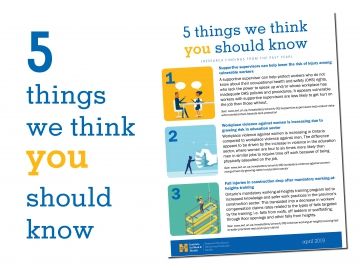
What 5 things do we think you should know during NAOSH Week?
To help you mark this year’s North American Occupational Safety and Health (NAOSH) Week, taking place now from May 5-11, we offer you “5 things we think you should know”—five important research findings from the Institute for Work & Health (IWH) in the past year. We suggest you share these findings with your work colleagues and peers. They can give rise to good discussions—this week or any week of the year.

Now hiring: Strategic foresight specialist for a one-year project coordinator contract
The Institute is seeking a strategic foresight specialist for a project coordinator position. This person will work on a federally funded research project examining the future of work for young people with disabilities. The Canadian labour market is undergoing a substantial shift with the rise of automation and precarious work. What are the implications for young people with disabilities, who already face barriers accessing the labour market?
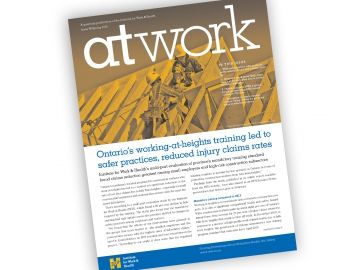
At Work Spring 2019 is out
The Spring 2019 issue of At Work is out! In this issue, read about a study evaluating the implementation and effectiveness of Ontario's mandatory working-at-heights training standard. Learn about the impact of unpaid caregiving responsibilities on women's work. See the trendlines for workplace violence in the two most at-risk sectors, broken down by gender.

What research can do: IWH collaboration with partners led to safety culture and system audit tool
The IRS CAAT is designed to measure "two sides of the coin"—an organization's OHS system and its safety culture. Developed by Workplace Safety North with industry support and IWH analysis, the tool is a testament to what research, in collaboration with front-line expertise, can achieve.

IWH Updates - Spring 2019
Long-time IWH senior scientist receives lifetime achievement award ~ IWH welcomes new member of Scientific Advisory Committee ~ Announcing new Mustard Fellow 2019/20

This Sunday, take a moment to mark Day of Mourning
The National Day of Mourning, held April 28 every year, is a day to remember all those who have lost their lives or suffered health consequences due to work hazards. Many of the Institute's partner organizations in the prevention system are sharing stories or holding events to mark the day.
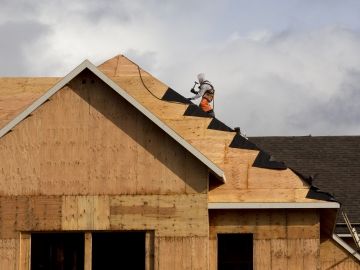
Ontario's mandatory working-at-heights training led to safer practices and reduced claims rates
Falls from heights are a significant occupational health and safety hazard. In 2015, Ontario’s Ministry of Labour implemented a mandatory training program to better protect construction workers who work at heights. An evaluation study by a team at the Institute for Work & Health has found that the training had high uptake across the province. It also led to a decline in claims rates due to falls targeted by the training—especially among very small employers and construction subsectors with the most frequent fall injuries.

See you at Partners in Prevention 2019
Are you going to Partners in Prevention on April 30-May 1? Come by our booth (Booth #525) to check out the latest IWH research findings and tools, and to pick up your copy of our popular handout, “5 things we think you should know.” While you’re there, get details about the XXII World Congress on Safety and Health at Work, a global forum on emerging challenges and cutting-edge best practices in occupational health and safety. The World Congress 2020, co-hosted by IWH and the Canadian Centre for Occupational Health and Safety (CCOHS), is coming to Toronto October 4-7, 2020.
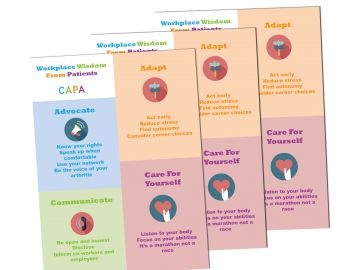
Arthritis advocacy organization develops resources with IWH research
For the three in five Canadians with arthritis who are of working age, a diagnosis can have considerable impact on work. The Canadian Arthritis Patient Alliance (CAPA), a Canada-wide, patient-driven grassroots organization, recently developed a set of resources for patients on managing the condition at work. To develop the resources, CAPA surveyed its members on employment needs and integrated research, including studies conducted by IWH. The Institute’s Dr Arif Jetha, especially, worked closely with CAPA to provide the evidence behind the messages.
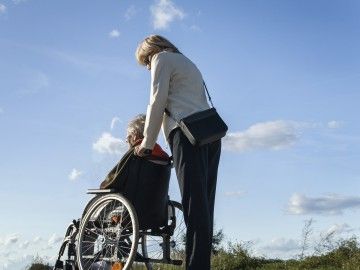
News release: women experience more work disruptions due to eldercare
The burden of caring for an older relative falls more on women than on men, and it’s showing up in women's higher rates of work disruption. According to a new Institute for Work & Health study, women are more likely than men to stop working, to work part-time or to take time off work during the week due to eldercare. The open access study is published in the Journals of Gerontology.

What supports, and how much, do boomers with chronic diseases need?
Older workers with diabetes or arthritis experience more fatigue and pain. But how different are they from healthy older workers in their need for, and use of, workplace accommodation and supports? An open access IWH study examined this question. It also looked at differences in work outcomes when people have access to supports when they’re needed.

International expert on work precarity and health inequity speaking in Toronto on April 11
Precarious employment is prevalent in low-income countries where as many as three in four workers are employed in the informal economy. Work precarity is also on the rise in high-income countries, where its effects are felt most by young workers, women, migrants and ethnic minorities. On April 11, Dr. Joan Benach, director of the Health Inequalities Research Group at Pompeu Fabra University in Barcelona, Spain, delivers the John R. Evans Lectureship in Global Health. The lecture, co-hosted by IWH, is free and open to the public.

Ontario employers: tell us about your experience hiring newcomers
Employers play an important role in both hiring and subsequently providing safe work environments for recent immigrants. Researchers at the Institute for Work & Health want to understand the opportunities and challenges employers experience regarding work integration of newcomers, and their resource needs to help newcomers stay safe at work. We invite you to help by participating in a research study that examines the experiences and expectations of employers in relation to hiring and training recent immigrants and refugees in Ontario.

Sign up now for IWH’s systematic review workshop in May
Learn how to plan, conduct and communicate the results of a systematic review from the best in the field. Registration is now open for the Institute’s yearly systematic review workshop, taking place May 15-17 in Toronto. Taught by experts from IWH and Cochrane Back and Neck, this three-day workshop is intended for clinical trainees, clinicians, decision-makers, academics and researchers (epidemiologists, statisticians) with a general interest in the methodology of systematic reviews and for those planning to conduct a systematic review in the future. Registration closes April 24 or when the workshop is full.

World Congress 2020 releases first program, opens registration
Connect with global leaders on emerging challenges, innovative solutions and best practices in workplace injury and illness prevention. The World Congress on Safety & Health at Work is coming to Toronto on October 4-7, 2020. Registration is now open, and the first program announcement is now available at the World Congress 2020 website. This global forum, designed for OHS leaders, policy-makers, employers and advocates, is organized by the International Labour Organization and the International Social Security Association, in conjunction with the Canadian co-hosts, IWH and the Canadian Centre for Occupational Health and Safety.

Supportive supervisors help reduce risks when workers face hazards, lack protection
Workers are vulnerable to injuries or illnesses when they're exposed to hazards and lacking protective factors such as OHS policies, awareness or empowerment. However, supportive supervisors can help lower the likelihood of injuries even when workers are vulnerable, according to a new study.
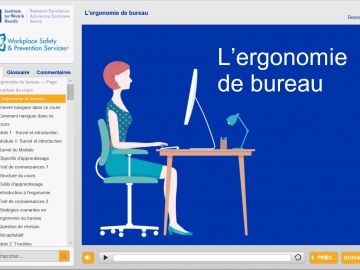
On RSI Day, access your eOfficeErgo training in French
February 28 is International Repetitive Strain Injury (RSI) Awareness Day. To help your workplace raise awareness about safe and healthy workstation practices, the Institute for Work & Health (IWH) brings you eOfficeErgo, an evidence-based and standard-compliant online ergonomics training program designed for people who regularly use computers on the job. In time for RSI Day, this free e-learning program is also now available in French, thanks to the support of l’Association paritaire pour la santé et la sécurité du travail du secteur affaires sociales (ASSTSAS).
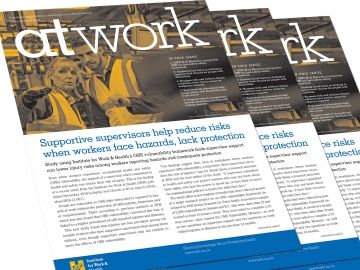
The Winter 2019 issue of At Work is out
In the latest issue of At Work, read about the role supervisors can play in lessening injury risks, even when workers are vulnerable due to hazard exposure and inadequate protection. Learn about a draft pan-Canadian strategy on improving work opportunities for people with disabilities, now being circulated for feedback from a broad cross-section of stakeholders. Also, baby boomers with arthritis or diabetes are not that different from healthy peers in how much they need, or use, workplace accommodations.
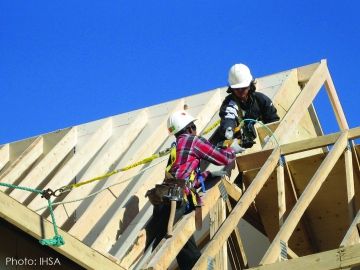
IWH Speaker Series: Evaluating the effectiveness of Ontario’s working-at-heights training standards
Serious injuries and fatalities resulting from falls from heights are a major concern in construction work. In 2015, Ontario’s Ministry of Labour implemented regulations defining working-at-heights training program standards and establishing a program for approving training providers in the province. In an IWH Speaker Series presentation on February 26, Scientist Dr. Lynda Robson shares findings from a study examining the reach and effectiveness of this training initiative.

Progress seen in occupational disease prevention, but data still lacking: speaker
For each person who dies from a work-related traumatic injury, at least six people die from an occupational disease. Many jurisdictions, Ontario included, have disease prevention as a priority, but we need more research and better surveillance systems to push ahead, says the 2018 Nachemson lecturer.

IWH Updates - Winter 2019
Two post-doc fellows join IWH scientist ranks ~ IWH’s eOfficeErgo available in French ~ Watch for World Congress 2020 program and registration announcements
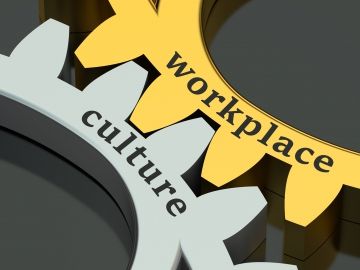
What research can do: SAFE Work Manitoba incorporates IWH tool into safety culture framework
They had a five-year plan with initiatives related to building a culture of safety across Manitoba. But they were missing a definition of safety culture—and a way to measure it. That was when SAFE Work Manitoba turned to IWH expertise.

Better disease, exposure surveillance key to progress on occupational disease prevention: Nachemson lecturer
For every person who dies from a work-related traumatic injury, at least six people die from an occupational disease. Fittingly, preventing the work exposures behind these diseases is a priority in many jurisdictions, including Ontario. But to push forward on this agenda, we need to build up our disease and exposure surveillance systems, Occupational Cancer Research Centre (OCRC) Director Dr. Paul Demers noted in his remarks last November at the 2018 annual Alf Nachemson Memorial Lecture, hosted by IWH. His Nachemson lecture is now available as a slidecast.
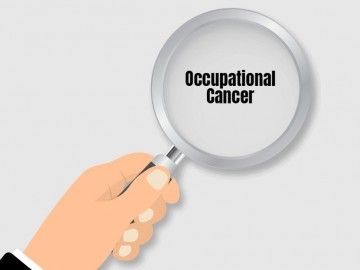
IWH applauds appointment of occupational cancer expert to lead review
The Institute for Work & Health (IWH) congratulates Ontario Minister of Labour Laurie Scott for her appointment of Dr. Paul Demers, director of the Occupational Cancer Research Centre in Toronto, to lead a review of the scientific evidence on the role of workplace exposures in causing cancers among Ontario workers. In a letter to the Minister, IWH President Cam Mustard says he expects the review will have influence in provincial jurisdictions across Canada.

Ontario Mining Association endorses safety climate and assessment audit tool
A tool designed to measure "two sides of the coin"—OHS systems and culture—developed by Workplace Safety North with Institute for Work & Health expertise, has been endorsed by the Ontario Mining Association, and now is in demand well beyond the province and the sector.

Draft strategy on improving employment of people with disabilities now available for feedback
Public consultation is now under way on a draft strategy for building an inclusive workforce—one where people with and without disabilities have the same choices in their jobs and careers. The organizations behind the draft strategy, hosts of the Disability and Work in Canada 2018 conference held last December in Ottawa, are hoping to gather input on the document from as many perspectives as possible.

IWH’s Dr. Nancy Carnide promoted to associate scientist
Congratulations to Dr. Nancy Carnide, who was recently named an associate scientist at the Institute. Previously a post-doctoral fellow at IWH, Carnide was also the recipient of a Canadian Institutes of Health Research (CIHR) Vanier Canada Graduate Scholarship and a CIHR Strategic Training Fellowship in Work Disability Prevention. Her current research interests focus on substance use and mental health problems among working populations.

Manitoba turns to IWH leading indicators in safety culture initiative
It had a five-year plan that included building a culture of safety across the province. What it was missing was a definition of safety culture—and a way to measure any progress made. That was when SAFE Work Manitoba turned to IWH and its work on occupational health and safety leading indicators. In this impact case study, we look at how the IWH Organizational Performance Metric is helping SAFE Work Manitoba achieve its goals.